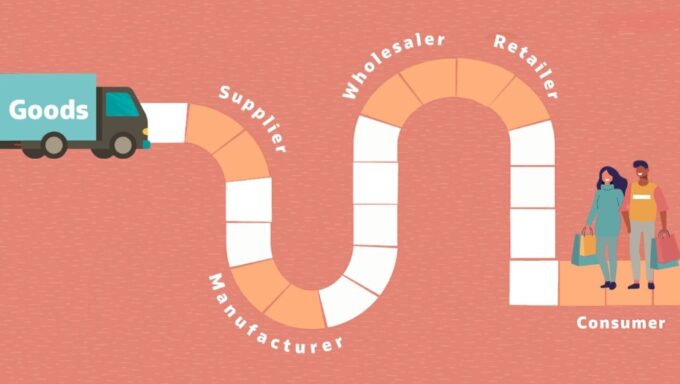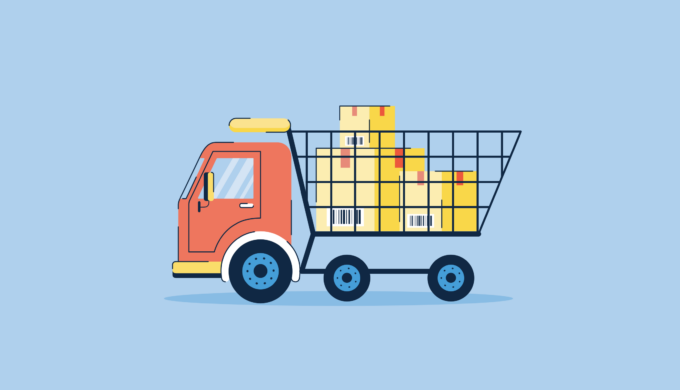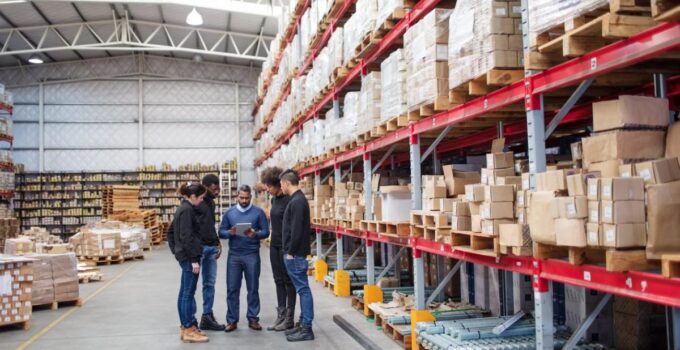Wholesale distributors are one of the most important links in the supply chain, but when it comes to their exact roles and responsibilities, many people are left wondering what their job actually is. We know some of the basics, but more often than not, this whole job description can be a mystery to us.
If you have ever wondered what they do, how they work, and what you need to know before choosing the right one for your brand, you’ve come to the right place. Here, we are going to demystify wholesale vendors and we will tell you everything you need to know so that you are prepared next time you need to collaborate with one.
What Is Their Role in the Distribution Process?

Source: netsuite.com
A large-scale distributor, in essence, acts as the critical bridge between manufacturers and retailers. They take on the responsibility of buying products in bulk from producers, storing these goods, and then selling them in smaller batches to retailers.
This modus operandi has proven beneficial for all parties involved. Manufacturers can offload large quantities of products quickly, retailers can keep their inventory stocked without committing to vast quantities, and consumers get access to a diverse range of products on their local store shelves.
When you spot a product on a retail shelf, it’s gone through quite the journey. It’s been stored, possibly repackaged or relabeled, and transported multiple times. Each of these stages is orchestrated efficiently by the bulk distributor. This sequence ensures that even if a product is manufactured thousands of miles away, it’s within easy reach for a consumer.
Also read: benefits of being a wholesale distributor.
How Do You Navigate the World of Finding the Right Distributor?
Embarking on the journey to find the ideal large-scale distributor for your organization can initially seem like a daunting task. After all, you’re not merely seeking a supplier but a partner, one that aligns with your brand goals and can propel you toward retail success.
A starting point is to attend industry-specific trade shows or conferences. These events not only present a golden opportunity to meet vendors face-to-face but also offer a glimpse into the latest market trends and innovations.
Another effective approach is leveraging professional networks. Seeking recommendations from peers or joining industry associations often opens doors to trusted merchants. In our digital age, online directories and platforms have also surged in popularity.
Websites dedicated to listing wholesalers in various categories can be treasure troves of information. They often offer reviews, ratings, and other critical data to help businesses make informed decisions. You can also check websites like GlobalSources where you can find wholesale distributors based on your exact needs and goals for your brand.
What Do You Need to Know About the Logistics and Operations?

Source: shipbob.com
At the heart of large-scale distribution is a complex ballet of logistics. Vendors need to have an acute understanding of demand, ensuring they stock up on products that retailers would want. Too little, and they risk losing business. Too much, and they face overstocking and potential losses.
Coupled with this logistical dance is the intricate web of relationships. Bulk merchants, over time, cultivate strong bonds with manufacturers and retailers. These relationships are vital for B2B eCommerce for distributors. A solid rapport with manufacturers can lead to better pricing, exclusive deals, or early access to new products.
On the flip side, a deep understanding of the retailers they serve ensures that distributors can anticipate needs, respond to market shifts, and even advise on trends.
How Has the Digital Age Revolutionized This Process?
The rise of e-commerce and digital platforms has unquestionably stirred the waters of the large-scale distribution industry. Direct-to-consumer models and online marketplaces are becoming more prevalent, but rather than seeing this as a threat, many vendors are leveraging the digital shift to their advantage.
Digital platforms now allow merchants to offer real-time inventory updates, seamless ordering processes, and even drop-shipping services. By merging traditional distribution methods with the capabilities offered by digital advancements, these firms are not only staying relevant but are setting new industry standards.
Furthermore, with the incorporation of Artificial Intelligence and machine learning, merchants are better equipped to predict market trends, understand purchasing behaviors, and optimize their logistical operations. This digital enhancement ensures they stay a step ahead, aligning their strategies with real-time data and insights.
What Are the Benefits of Collaborating With Them?

Source: g2.com
Engaging with a bulk distributor carries with it a multitude of advantages for retailers. One of the primary benefits lies in economies of scale. Buying in bulk typically translates to reduced costs, allowing retailers to enjoy better profit margins. This system eliminates the need for retailers to negotiate or deal directly with multiple manufacturers, saving time and administrative overhead.
Merchants also offer an impressive range of products. Retailers can diversify their offerings without the hassle of juggling multiple manufacturer relationships. This diversity ensures that retailers can rapidly respond to market demands or shifts in consumer preferences. Furthermore, seasoned vendors possess deep market insights, often sharing knowledge about upcoming trends, thus positioning retailers at the forefront of market evolution.
What Do You Need to Be Aware of When It Comes to the Financial Aspect?
It’s not all about product acquisition. Many large-scale distributors provide flexible payment terms, offering retailers breathing room in managing their cash flows. This financial flexibility can be particularly advantageous for newer retail establishments or those looking to expand.
Alongside, some vendors also extend marketing support, providing promotional materials, product training, or even co-op advertising opportunities. Such backing amplifies a retailer’s marketing efforts, driving footfall and sales.
Demystifying the world of bulk vendors reveals an industry that, while often operating behind the scenes, is integral to the retail ecosystem. These firms, with their logistical prowess and relationship-building expertise, ensure that the global retail machine runs smoothly. As technology continues to advance and reshape industries, large-scale merchants remain adaptable and pivotal.
They’re a testament to the fact that while retail may be the face the consumer sees, there’s a complex, efficient, and ever-evolving system working diligently behind the curtain. And at its core, stand the wholesale vendors, the unsung heroes ensuring that products, from every corner of the globe, are within our reach.







